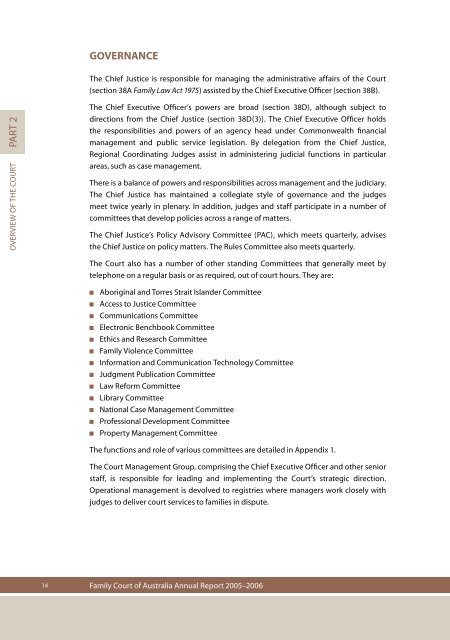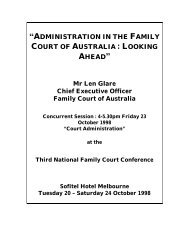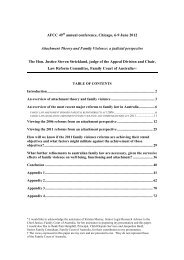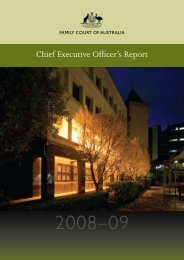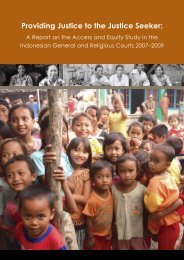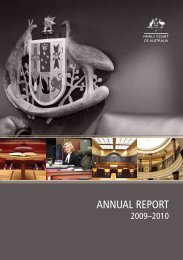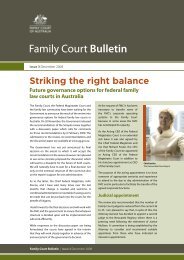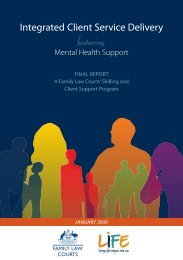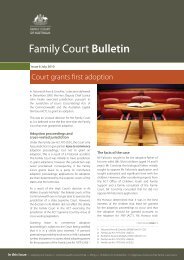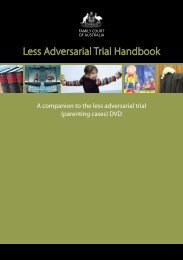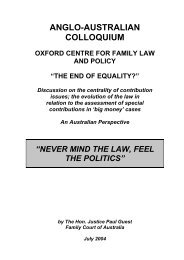View a full copy of this report (PDF Size - 3.69 MB) - Family Court of ...
View a full copy of this report (PDF Size - 3.69 MB) - Family Court of ...
View a full copy of this report (PDF Size - 3.69 MB) - Family Court of ...
You also want an ePaper? Increase the reach of your titles
YUMPU automatically turns print PDFs into web optimized ePapers that Google loves.
Governance<br />
The Chief Justice is responsible for managing the administrative affairs <strong>of</strong> the <strong>Court</strong><br />
(section 38A <strong>Family</strong> Law Act 1975) assisted by the Chief Executive Officer (section 38B).<br />
Overview <strong>of</strong> the court Part 2<br />
The Chief Executive Officer’s powers are broad (section 38D), although subject to<br />
directions from the Chief Justice (section 38D(3)). The Chief Executive Officer holds<br />
the responsibilities and powers <strong>of</strong> an agency head under Commonwealth financial<br />
management and public service legislation. By delegation from the Chief Justice,<br />
Regional Coordinating Judges assist in administering judicial functions in particular<br />
areas, such as case management.<br />
There is a balance <strong>of</strong> powers and responsibilities across management and the judiciary.<br />
The Chief Justice has maintained a collegiate style <strong>of</strong> governance and the judges<br />
meet twice yearly in plenary. In addition, judges and staff participate in a number <strong>of</strong><br />
committees that develop policies across a range <strong>of</strong> matters.<br />
The Chief Justice’s Policy Advisory Committee (PAC), which meets quarterly, advises<br />
the Chief Justice on policy matters. The Rules Committee also meets quarterly.<br />
The <strong>Court</strong> also has a number <strong>of</strong> other standing Committees that generally meet by<br />
telephone on a regular basis or as required, out <strong>of</strong> court hours. They are:<br />
Aboriginal and Torres Strait Islander Committee<br />
Access to Justice Committee<br />
Communications Committee<br />
Electronic Benchbook Committee<br />
Ethics and Research Committee<br />
<strong>Family</strong> Violence Committee<br />
Information and Communication Technology Committee<br />
Judgment Publication Committee<br />
Law Reform Committee<br />
Library Committee<br />
National Case Management Committee<br />
Pr<strong>of</strong>essional Development Committee<br />
Property Management Committee<br />
The functions and role <strong>of</strong> various committees are detailed in Appendix 1.<br />
The <strong>Court</strong> Management Group, comprising the Chief Executive Officer and other senior<br />
staff, is responsible for leading and implementing the <strong>Court</strong>’s strategic direction.<br />
Operational management is devolved to registries where managers work closely with<br />
judges to deliver court services to families in dispute.<br />
14<br />
<strong>Family</strong> <strong>Court</strong> <strong>of</strong> Australia Annual Report 2005–2006


